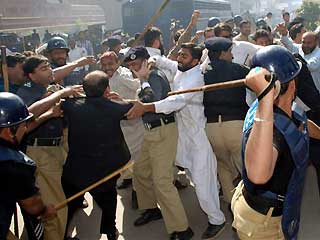ROUNDUP: Pakistan launches clampdown ahead of protest march
 Islamabad - Pakistani police on Wednesday arrested hundreds of opposition activists and anti-government lawyers to forestall this week's planned cross-country protest march, which could send the year-old government into a tailspin, officials said.
Islamabad - Pakistani police on Wednesday arrested hundreds of opposition activists and anti-government lawyers to forestall this week's planned cross-country protest march, which could send the year-old government into a tailspin, officials said.
Most of the arrests were made in the eastern province of Punjab, the power centre of popular opposition leader and former prime minister Nawaz Sharif.
The arrests came after an overnight ban on public gatherings in Punjab and were followed by a similar ban in the southern Sindh province.
"More than 300 people have been taken into custody to prevent any disturbance in the law and order situation," Punjab's Home Secretary Rao Iftikhar told reporters in the provincial capital Lahore. But opposition politicians and lawyers' organizers claimed the arrests were in the thousands.
"The government has lost its nerves," Sharif said while addressing a large crowd of party workers in the mountain town of Abbottabad. The ban on public gatherings cannot hold back the sea of people who want to change the "ineffective system," he added.
"Yes it is possible, it will happen in a week or even three days," Sharif stressed.
Opposition parties have joined the defiant lawyers in their planned rally, which they have named the "Long March."
Protesters are calling for the reinstatement of former Supreme Court chief justice Iftikhar Chaudhry, who was sacked by ex-president Pervez Musharraf in 2007.
The march is scheduled to begin in Sindh and Balochistan provinces on Thursday and will go through Punjab and culminate with an indefinite sit-in outside the parliament building in Islamabad on Monday.
But the national government, which is led by President Asif Ali Zardari's Pakistan People's Party (PPP), had decided to block the protests with force, raising fears of a violent showdown.
Ali Ahmad Kurd, head of the lawyers' campaign, however, vowed to go ahead with the protest, saying marchers would proceed even if their mainstream leaders were taken into custody.
Sharif's Pakistan Muslim League-Nawaz (PML-N) party also decried the police crackdown as dictatorial. Besides detaining scores of activists, the police put several of the party's key leaders, including its chairman Raja Zafarul Haq, under house arrest.
"The arrests have strengthened our resolve to fight for an independent judiciary and rule of law," party spokesman Ahsan Iqbal said.
Information Minister Sherry Rehman, however, said the government was left with no other choice but to make arrests after Sharif incited people to civil disobedience.
"This was the last option available to us. We were pushed to the wall," she told reporters in Islamabad.
Sharif's party ruled Punjab until late February when the Supreme Court barred the two-time ex-premier and his brother, Shahbaz Sharif, from office.
The judgment removed Shahbaz from the seat of chief minister, sparking a wave of angry protests throughout Punjab. Zardari was blamed for influencing the verdict, but he denied the allegations.
Zardari, along with Sharif, who remained his coalition partner for five months, earlier pledged to reinstate Chaudhry, but later backed off amid speculation that independent-minded judges could reverse a controversial law by Musharraf that cleared Zardari of graft charges.
The political conflict has raised concern among Western countries who want nuclear-armed Pakistan to focus on the fight against militancy in its restive north-western region near Afghanistan.
US envoy in Islamabad, Anne W Patterson, held separate meetings with Prime Minister Yousuf Raza Gilani and his coalition partner Asfandyar Wali, the head of secular Awami National Party that rules the militancy-hit North West Frontier Province (NWFP), and discussed the political situation in the country. The details of the talks were not available.
The meetings came as Pakistan was rife with rumours that Sharif was placed under house arrest, though he addressed a public gathering in NWFP, and that Zardari was not returning to Islamabad after his Tehran visit. The hearsay was denied by his spokesman.
A meeting between Pakistan's army chief Ashfaq Parvez Kayani and Gilani also stirred speculations that the military might be planning to intervene in the deadlock between the two traditional rivals - Zardari's PPP and Sharif's PML-N. (dpa)